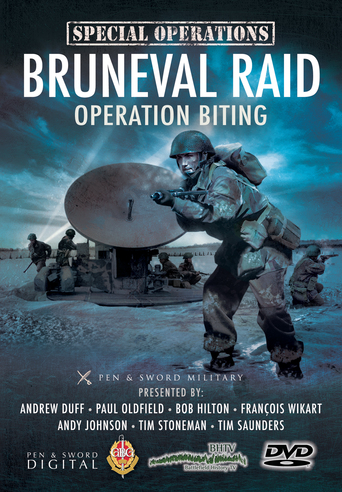Bruneval Raid: Operation Biting
In 1941 Dr RV Jones realised that the Germans had developed their own radar system that would account for increasing RAF bomber casualties. An enemy Würzburg system was located on the cliffs of Northern France at Bruneval. An operation was planned to seize it involving all three Services, including the newly raised C Coy, 2 Para, commanded by Major John Frost. The planning went well but the rehearsals were all disastrous. As the narrow window of moon and tide approached it was decided 'to bash on'. Nine of the twelve sticks of Paratroopers were dropped by 51 Squadron and the Germans were caught napping. However, they quickly responded and the Paras had a serious fight on their hands to keep the enemy at bay while the experts, who the Paras had orders to kill rather than let fall into enemy hands, dismantled the radar. With the enemy closing in the job was done and the force withdrew. It seemed that they may be caught but they made it to their badly delayed landing craft. In 1941 Dr RV Jones realised that the Germans had developed their own radar system that would account for increasing RAF bomber casualties. An enemy Würzburg system was located on the cliffs of Northern France at Bruneval. An operation was planned to seize it involving all three Services, including the newly raised C Coy, 2 Para, commanded by Major John Frost. The planning went well but the rehearsals were all disastrous. As the narrow window of moon and tide approached it was decided 'to bash on'. Nine of the twelve sticks of Paratroopers were dropped by 51 Squadron and the Germans were caught napping. However, they quickly responded and the Paras had a serious fight on their hands to keep the enemy at bay while the experts, who the Paras had orders to kill rather than let fall into enemy hands, dismantled the radar. With the enemy closing in the job was done and the force withdrew. It seemed that they may be caught but they made it to their badly delayed landing craft. In 1941 Dr RV Jones realised that the Germans had developed their own radar system that would account for increasing RAF bomber casualties. An enemy Würzburg system was located on the cliffs of Northern France at Bruneval. An operation was planned to seize it involving all three Services, including the newly raised C Coy, 2 Para, commanded by Major John Frost. The planning went well but the rehearsals were all disastrous. As the narrow window of moon and tide approached it was decided 'to bash on'. Nine of the twelve sticks of Paratroopers were dropped by 51 Squadron and the Germans were caught napping. However, they quickly responded and the Paras had a serious fight on their hands to keep the enemy at bay while the experts, who the Paras had orders to kill rather than let fall into enemy hands, dismantled the radar. With the enemy closing in the job was done and the force withdrew. It seemed that they may be caught but they made it to their badly delayed landing craft. In 1941 Dr RV Jones realised that the Germans had developed their own radar system that would account for increasing RAF bomber casualties. An enemy Würzburg system was located on the cliffs of Northern France at Bruneval. An operation was planned to seize it involving all three Services, including the newly raised C Coy, 2 Para, commanded by Major John Frost. The planning went well but the rehearsals were all disastrous. As the narrow window of moon and tide approached it was decided 'to bash on'. Nine of the twelve sticks of Paratroopers were dropped by 51 Squadron and the Germans were caught napping. However, they quickly responded and the Paras had a serious fight on their hands to keep the enemy at bay while the experts, who the Paras had orders to kill rather than let fall into enemy hands, dismantled the radar. With the enemy closing in the job was done and the force withdrew. It seemed that they may be caught but they made it to their badly delayed landing craft.



 AD
AD
